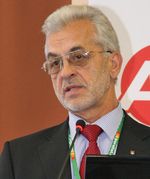The Odesa Oil Refinery (OOR) began recommissioning its equipment in preparation for resuming operations on March 29, with the primary oil refining unit being the first to be restarted. The plant’s new owner, the Eastern European Fuel and Energy Company (EEFEC), promises to get it at full capacity in two to six months, allowing the refinery to process about 230,000 tons of oil per month, or 2.5 million tons per year.
Let us recall that the OOR sat idle since October 2010 as it lacked raw material. Its previous owner Lukoil failed to agree on oil supply via Odesa-Brody pipeline.
The current owners are planning to supply crude oil for the OOR by sea. The Russian Urals blend consignments will be transshipped at the port of Odesa. The EEFEC notes that the seaborne scheme will be more difficult and more expensive for the OOR than the transportation by land. However, they had no choice as a pipeline supply agreement is still absent.
THE SYMBOLIC BUTTON
The EEFEC’s publicity-shy chairman Serhii Kurchenko and Minister of Energy and Coal Industry of Ukraine Eduard Stavytsky flew to Odesa to restart the primary oil refining unit by pressing a dummy red button. The national and regional media that had been accredited for the event had to wait for the honored guests’ arrival standing outside the OOR’s premises for several hours. Similarly, the company ordered the press representatives to remove themselves from the premises as soon as Kurchenko and Stavytsky departed, preventing TV teams from even shooting videos of the OOR that were essential for their stories.
Kurchenko limited himself to greeting the refinery’s workforce, with his speech including announcing the restart to be the beginning of the Ukrainian oil refining revival and thanking Lukoil for transferring the plant to his ownership in “perfect condition.” The media that addressed their questions to Kurchenko at a short press conference got their answers from the EEFEC’s CEO Oleksandr Kaplan instead, and were advised to direct any remaining inquiries to the company’s press service.
“We can produce Euro 5-compliant high-octane gasoline... Regarding the plant’s further modernization, we do have extensive plans for it. However, I feel that now is not the time to go into the specifics,” Kaplan said.
The Ministry of Energy and Coal Industry is betting on the OOR’s restart as the first step of the nationwide oil refining recovery. According to the minister Stavytsky, the government’s projections call for processing up to one million tons of oil per month by the end of 2013. By the way of comparison, the Ukrainian refineries processed only half a million tons over the first two months of 2013, down almost 64 percent year-on-year.
To facilitate the “oil refining revival,” the ministry is preparing a number of incentives for the industry.
“The government is now working on a protectionist program, squarely aimed at providing incentives for improving the state of the nation’s oil refining industry. The ministry will offer our proposals to the government in a week or two, bringing more stability to the industry... They will be implemented as the Cabinet’s decrees soon, and then will go on to be enshrined in laws,” Stavytsky promised. The minister did not elaborate on the details of the possible improvements in the industry’s situation, though, leaving the question of the possible imposition of import duties on petroleum products unanswered as well.
Meanwhile, the energy expert Valentyn Zemliansky who was present at the start of recommissioning ceremony did not rule out this option. “Duties are a possible protectionist measure for the domestic oil refining industry. They can be used, say, seasonally. That is, the government can increase duties in winter, when demand falls, and reduce them in summer, when it increases,” Zemliansky said.
Let us recall that the Head of the Antimonopoly Committee of Ukraine (AMCU) Vasyl Tsushko urged the government to speed up the introduction of duties on March 28. “We need a year or two of protectionist measures until the Ukrainian refineries have carried out reconstruction and started producing Euro 3 and Euro 4-compliant gasoline. The government should decide on the best mechanisms to facilitate this process. They may include import duties as well as subsidies,” Liga.net site quoted Tsushko as saying.
In addition, according to the AMCU’s head, the introduction of import duties on petroleum products would not greatly affect the price at the pump. He thinks the duties discussion to be somewhat slow-moving currently, and sees the need to expedite this process. “The imported petroleum products’ share on the national market is a matter of national security,” Tsushko stressed.
Let us recall that some domestic experts are sharing none of the official’s opinions. Even the Prime Minister of Ukraine Mykola Azarov had said that the introduction of import duties on petroleum products would hit the price at the pump. He sees the modernization of Ukrainian refineries as more necessary than the duties.
COMMENTARIES
THE INDUSTRY NEEDS FIVE BILLION DOLLARS FOR MODERNIZATION
Leonid KOSIANCHUK, president of the Association of Petroleum Products Market Operators of Ukraine:
 “The government should not spend its money and effort modernizing the Ukrainian oil refineries, for every single of them is owned by an oligarch, and the problems of a company should be its owner’s concern. The government should only create favorable conditions for reconstruction, for example, by eliminating taxes on imports of equipment needed for modernization and granting a tax holiday for a limited post-modernization period.
“The government should not spend its money and effort modernizing the Ukrainian oil refineries, for every single of them is owned by an oligarch, and the problems of a company should be its owner’s concern. The government should only create favorable conditions for reconstruction, for example, by eliminating taxes on imports of equipment needed for modernization and granting a tax holiday for a limited post-modernization period.
“However, modernization of refineries is a lengthy process taking from three to four and a half years, because the equipment for oil refineries is produced by very few companies in the entire world. One must order it in advance and then wait for its delivery... The modernization’s costs run into hundreds of millions of dollars for a refinery, while the entire industry needs about five billion dollars for modernization.
“At the same time, import duties on petroleum products would not affect the modernization of refineries. It would be just another tax on motorists. Should the duty be set at 180 dollars per ton, the liter of gasoline will go up by 1.5 hryvnias.
“Moreover, the quality of Ukrainian-produced fuel should have been improved back in 2011, but the old regulations have remained in force.
“Should the government force the owners of refineries to modernize them or transfer them to more efficient owners, we will have no need for any imports whatsoever, because Ukraine has excess refining capacity. Even Kremenchuk and Odesa refineries, should they achieve full capacity, will decrease the imports’ share on the market to less than 20 percent, and even that share will consist of the premium gasoline blends that Ukraine cannot produce anyway.”
BY HARMING ANTITRUST ENVIRONMENT, PROTECTIONISM COULD TRIGGER A SHARP INCREASE IN FUEL PRICES
Dmytro MARUNYCH, director of the Institute for Energy Research:
 “Any memorandum which the government signs with the refiners will not be effective unless the government will enforce it strictly. But such enforcement is absent, we are witnessing the new and stricter regulations having no effect and the refineries breaking their commitments as they are not ready to comply with the current European standards. If the government is ready to use protectionist measures to revive the oil refining industry, it should enforce strictly the compliance with the new environmental regulations Euro 4 and Euro 5.
“Any memorandum which the government signs with the refiners will not be effective unless the government will enforce it strictly. But such enforcement is absent, we are witnessing the new and stricter regulations having no effect and the refineries breaking their commitments as they are not ready to comply with the current European standards. If the government is ready to use protectionist measures to revive the oil refining industry, it should enforce strictly the compliance with the new environmental regulations Euro 4 and Euro 5.
“However, we do need the oil refining industry revived. Its capacity has totaled 50 million tons of oil per year since the Soviet time. This is quite a large industry that makes products with relatively high added value. Accordingly, the taxes paid on all stages of processing are supporting both local budgets and the national budget.
“However, we must try not to disturb the fragile balance on the Ukrainian petroleum products market. The share of imports reaches 60 percent in certain segments. It is quite a lot, but by harming antitrust environment, protectionism could trigger a sharp increase in fuel prices.”







